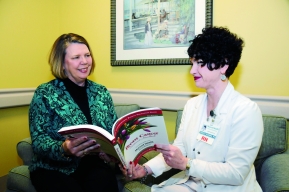Oncology Nurse Navigator: Friend, Advocate and Guide on Your Cancer Journey
A tidal wave of emotion, fear and confusion.
“When a person hears the word cancer they’re often overwhelmed. Their lives are filled with unfamiliar medical terminology, appointments, tests, and life-or-death decisions about their prognosis,” says McLeod Oncology Nurse Navigator Tracey Godwin, RN “It’s at this point that the patient may benefit from the support of a nurse or social worker — someone who understands their disease and can help them navigate through their cancer journey.”
Navigator’s History
Navigators are the newest members of the multi-disciplinary cancer team. First introduced in the 1980’s, Navigators helped populations that had trouble accessing or understanding the health care system – such as low-income urban families or the rural Amish. Today, the concept has expanded the Navigator’s role to help most patients.
A lot of people see us as an extra level of support, patients hear what the physicians have to say but it’s sometimes too much to remember, and they call us later with questions.
Navigator’s Role
The navigator is a single point-of-contact for the patient. They are available to the patient and their family immediately after diagnosis and offer:
- Help in making and remembering appointments.
- Coordination of the various medical providers.
- Education about specific types of cancer.
- Explanations of the medical terms, medications and procedures.
- Emotional support, when needed.
- Communication with family members.
- An Advocate in removing barriers and obstacles a patient encounters
Many patients welcome this type of additional support. A couple of scientific studies agree, plus navigators may also improve the patient’s outcomes.
One study cited a reduced length of hospital stay, improved quality of life and higher patient satisfaction. Another study reported that patients felt more involved in their own care, were better prepared for the future and felt their healthcare team had made an extra effort to make them feel better emotionally.
Final Thought. If you or someone you know is diagnosed with cancer, find a cancer treatment center that offers the support of an Oncology Navigator specially trained to deal with your type of cancer. Study findings show the additional level of support may help improve a patient’s emotional and physical cancer journey.
Also see: 7 Things to Look for When Choosing a Cancer Center and Questions to Ask Your Oncologist About Your Cancer.
To find a physician, click here.
Sources include: McLeod Health, National Coalition of Oncology Nurse Navigators, National Cancer Institute, National Institutes of Health, Group Health Research Institute, Journal of Clinical Oncology.
-
McLEOD REGIONAL MEDICAL CENTER FLORENCE
843-777-2000 -
McLEOD DARLINGTON
843-777-1100 -
McLEOD DILLON
843-774-4111 -
McLEOD LORIS
843-716-7000 -
McLEOD SEACOAST
843-390-8100 -
McLEOD CHERAW
843-537-7881 -
McLEOD CLARENDON
803-433-3000



-
McLEOD REGIONAL MEDICAL CENTER FLORENCE
843-777-2000 -
McLEOD DARLINGTON
843-777-1100 -
McLEOD DILLON
843-774-4111 -
McLEOD LORIS
843-716-7000 -
McLEOD SEACOAST
843-390-8100 -
McLEOD CHERAW
843-537-7881 -
McLEOD CLARENDON
803-433-3000
 Find a Doctor
Find a Doctor  Locations
Locations  Services
Services 